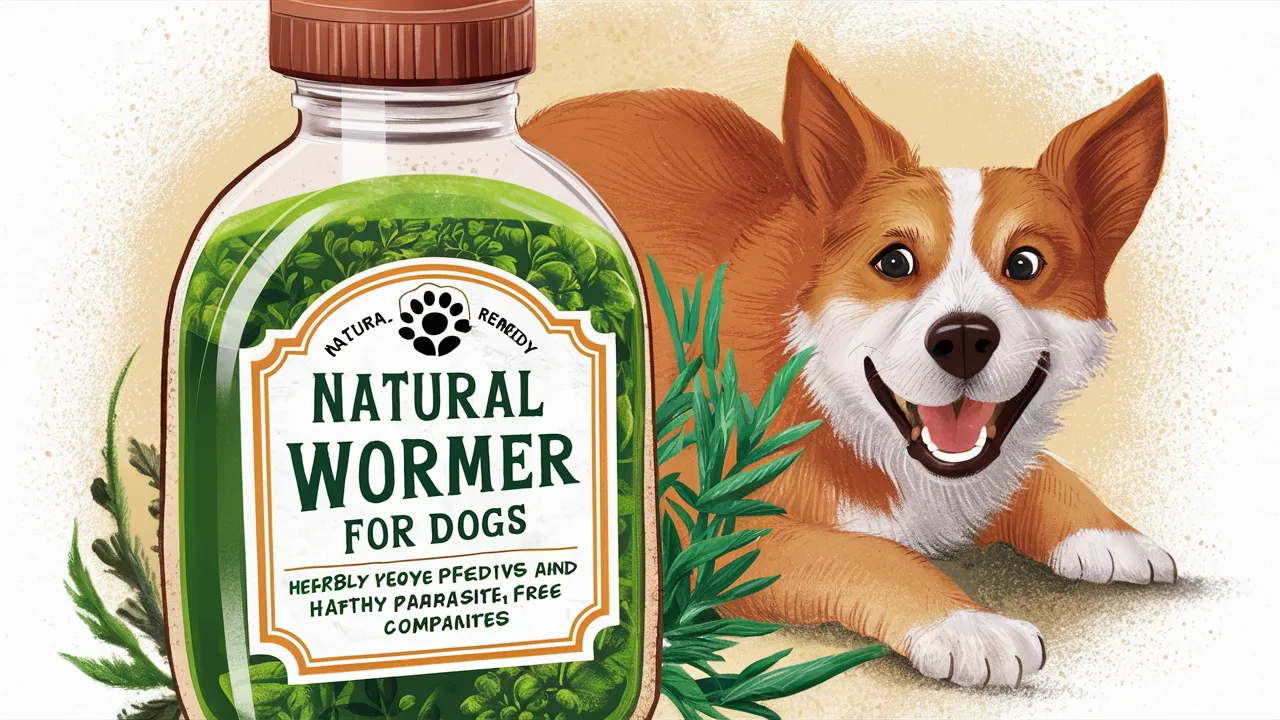Explore Natural Wormer For Dogs! Discover safe and effective remedies using ingredients like pumpkin seeds, garlic, and diatomaceous earth.
Learn how to keep your pup healthy and parasite-free naturally by Dogs Infor!
Understanding Dog Worms and Deworming
Types of Worms in Dogs
Dogs can be infected with various types of intestinal parasites, commonly known as worms. Some of the most common types include:
Roundworms: These long, thin worms are often white or cream-colored. They are commonly found in puppies and can cause weight loss, diarrhea, and a pot-bellied appearance.
Hookworms: These small, hook-shaped worms attach to the intestinal wall and can cause blood loss, anemia, and diarrhea.
Tapeworms: These segmented, flat worms can be several inches long. They are often transmitted through fleas and can cause weight loss, diarrhea, and a scooting behavior.
Whipworms: These thin, whip-shaped worms live in the large intestine and can cause diarrhea, weight loss, and rectal prolapse.
Symptoms of Worm Infection
The symptoms of worm infection can vary depending on the type of worm and the severity of the infection. Some common symptoms include:
- Weight loss
- Diarrhea
- Vomiting
- Dull coat
- Pot-bellied appearance
- Scooting
- Rectal prolapse
- Coughing
- Anemia
Importance of Deworming
Deworming is crucial for maintaining the health of your dog. Regular deworming helps to prevent and control worm infections, which can lead to serious health problems.
Here’s why deworming is important:
- Prevents illness: Worms can cause a range of health issues, including weight loss, anemia, and intestinal blockages.
- Protects other animals: Some types of worms can be transmitted to other animals, including humans.
- Improves overall health: Deworming helps to ensure your dog’s digestive system is functioning properly and that they are absorbing nutrients effectively.
Talk to your veterinarian about the appropriate deworming schedule for your dog. The frequency of deworming will depend on your dog’s age, breed, lifestyle, and the prevalence of worms in your area.

The Options Natural Wormer For Dogs
While there are many commercially available deworming medications, some pet owners prefer natural alternatives. Here are some commonly suggested natural wormer options for dogs:
Pumpkin Seeds
Pumpkin seeds are rich in cucurbitacin, a compound that can help paralyze and expel intestinal worms. You can feed your dog raw or roasted pumpkin seeds, or you can purchase pumpkin seed powder.
Dosage: 1-2 tablespoons of pumpkin seeds per day, depending on your dog’s size.
Garlic
Garlic contains allicin, a compound that has anti-parasitic properties. However, it’s crucial to use garlic in moderation, as it can be toxic to dogs in large quantities.
Dosage: 1/4 clove of garlic per 10 pounds of body weight, once or twice a week.
Diatomaceous Earth
Diatomaceous earth is a natural substance made from fossilized algae. It contains silica, which can dehydrate and kill parasites by damaging their exoskeletons. However, it’s important to use food-grade diatomaceous earth, as other types can be harmful to dogs.
Dosage: 1/2 teaspoon per 25 pounds of body weight, once or twice a day.
Other Natural Ingredients
- Papaya Seeds: Papaya seeds contain papain, an enzyme that can help break down parasites.
- Apple Cider Vinegar: Apple cider vinegar has antimicrobial properties and can help create an unfavorable environment for parasites.
Important Note: It’s crucial to consult with your veterinarian before using any natural wormer options for your dog. They can advise on the appropriate dosage, potential risks, and whether these options are suitable for your dog’s specific needs.
Disclaimer: The information provided is for general knowledge and informational purposes only, and does not constitute medical advice. It is essential to consult with a qualified veterinarian for any health concerns or before making any decisions related to your pet’s health or treatment.

How to Use Natural Wormers Effectively
While natural wormers can be a helpful addition to a dog’s overall health regimen, it’s crucial to use them effectively and safely. Here’s a breakdown of key considerations:
Dosage and Frequency
- Follow Recommended Guidelines: Always consult with your veterinarian for the appropriate dosage and frequency for your dog’s specific needs.
- Start Slowly: Begin with a lower dose and gradually increase it as needed, monitoring your dog’s response.
- Consistency is Key: For optimal results, administer natural wormers consistently over a period of time, as recommended by your veterinarian.
Combining Natural Methods
- Multi-faceted Approach: Consider combining different natural wormer options for a more comprehensive approach. For example, you might use pumpkin seeds daily and add garlic to their food once or twice a week.
- Consult Your Vet: Before combining any natural remedies, always discuss it with your veterinarian to ensure they are safe and effective for your dog.
Monitoring Your Dog’s Health
- Observe for Changes: Carefully monitor your dog for any signs of improvement or worsening symptoms.
- Report to Your Vet: If you notice any adverse reactions or if your dog’s condition doesn’t improve, contact your veterinarian immediately.
Remember: Natural wormers are not a substitute for veterinary care. If you suspect your dog has a worm infection, it’s essential to seek professional veterinary advice for diagnosis and treatment.
Conclusion
Natural Wormer For Dogs can be a helpful addition to a dog’s overall health regimen, but they should be used with caution and under veterinary guidance. Some common natural wormer options include pumpkin seeds, garlic, and diatomaceous earth.
For the best possible care of your dog, always consult with your veterinarian for personalized advice regarding deworming strategies. They can assess your dog’s individual needs, recommend the most effective treatment plan, and ensure the safety and well-being of your furry friend.

Related Post
Signs Your Dog Needs Probiotics: Digestive Problems
Green Stool In Dogs: Causes, Concerns And When To Worry
Dental Anatomy Of Dogs: Unveiling The Secrets